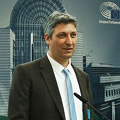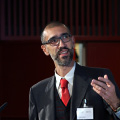

Con la sessione di laurea di marzo 2021 la Scuola di Studi Internazionali (SSI) ha raggiunto il traguardo di 500 laureati e laureate. Istituita nel 2001 nell’ambito dell’accordo di programma con la Provincia autonoma di Trento (PAT), la Scuola è divenuta un Centro di Ateneo nel 2012. Si tratta dell'unica Graduate School in Italia a offrire esclusivamente corsi di studio di secondo e terzo livello in studi internazionali.
La SSI propone tre lauree magistrali e un dottorato di ricerca, insegnati interamente in inglese e con uno spiccato taglio multidisciplinare. Alla laurea magistrale in European and International Studies (MEIS), si sono aggiunte quella in International Security Studies (MISS) – in collaborazione con la Scuola Superiore Sant'Anna di Pisa – e la laurea magistrale Erasmus Mundus International Master in Security, Intelligence and Strategic Studies (IMSISS), in collaborazione con l’Università di Glasgow, la Dublin City University e la Charles University di Praga.
Ripercorriamo il tragitto professionale di alcuni Alumni della Scuola, chiedendo loro cosa ricordano della propria esperienza e quali consigli darebbero a studenti, studentesse, neolaureati e neolaureate di oggi.
Account Manager presso Hume Brophy (Brussels), Lorenzo Livraghi ha conseguito la laurea in European and International Studies nel 2016. Lorenzo ricorda “l’incontro con un metodo didattico interattivo” che lo “ha aiutato a sviluppare una serie di competenze molto utili, come le abilità di presentazione, scrittura e comunicazione in inglese”. Lorenzo sottolinea “il gran numero di attività organizzate dalla SSI per aiutare gli studenti ad orientarsi verso una carriera lavorativa”, inclusi gli incontri con “professionisti di svariati settori che hanno condiviso le loro esperienze”; e inoltre alcuni “contenuti accademici acquisiti nei corsi, come la conoscenza delle varie fasi del processo decisionale dell’Unione Europea”, che lo hanno aiutato a muovere “i primi passi nel settore del lobbying/public affairs a Bruxelles”. Lorenzo rivela di ricorrere ancora spesso a banche dati e fonti che ha incontrato durante la stesura della tesi di laurea. A chi ha appena conseguito la laurea consiglia di “focalizzarsi su un settore lavorativo specifico sulla base dei propri interessi, dotandosi degli strumenti necessari per intraprendere la carriera cui aspira”.
Ginevra Fontana si è laureata in International Security Studies nel 2019. Attualmente è assistente di progetto presso il Centro Militare di Studi Strategici (Roma). Ginevra si sofferma su come l’esperienza di studio tra Pisa e Trento le abbia trasmesso un forte amore per l’interdisciplinarietà. “La laurea magistrale MISS, insieme con l’esperienza di collaborazione con l’Ufficio Mobilità Internazionale dell’Ateneo, che ho portato avanti durante gli studi, mi hanno fornito un insieme di strumenti immediatamente spendibili nel mondo del lavoro: flessibilità e adattabilità, preparazione a tutto tondo, pianificazione (ho seguito tutti i corsi a scelta che riuscivo a mettere in agenda). A un neolaureato del 2021 consiglierei di fare tesoro degli incontri con i professionisti organizzati dalla Scuola e del network Alumni, partecipando a tutti gli eventi segnalati sulla pagina Facebook della SSI. Inoltre, credo sia fondamentale sfruttare i consigli che vengono, in modo formale e informale, da docenti e compagni che si incontrano durante il percorso, che sono fondamentali per trovare la propria strada. Infine, non bisogna sottovalutare mai l’importanza del lavoro di squadra.”
Per qualcuno, la laurea alla Scuola di Studi Internazionali è stato il trampolino di lancio per una carriera accademica. È il caso di tre compagni di studio che hanno conseguito il titolo magistrale nel 2012: Tommaso Milani (ora all’Istituto Universitario Europeo), Lorenzo Piccoli (all’Università di Neuchâtel), e Matia Vannoni (al King's College London). “Ricordiamo con piacere il forte senso di cameratismo tra gli studenti e il forte legame con i docenti: è difficile immaginare un ambiente più inclusivo e stimolante.” I tre giovani accademici sottolineano come la combinazione di conoscenze e soft skills acquisite durate il MEIS si siano rivelate cruciali per la loro carriera. “All'inizio – ricordano – abbiamo pensato che la varietà di approcci e discipline a cui eravamo esposti fosse dispersiva, ma alla fine ci ha aiutato a sviluppare la capacità di analisi e l’utilizzo dell’evidenza empirica per sostenere o confutare la teoria. La flessibilità metodologica è essenziale nel mondo accademico di oggi.” Questo è anche il consiglio che si sentono di dare ai neolaureati e alle neolaureate di oggi: “La pandemia che stiamo vivendo dimostra l'importanza di un approccio pluralistico che permetta di pensare fuori dagli schemi e di abbattere alcuni dei confini intellettuali preesistenti. Consigliamo agli studenti di prendere in considerazione una vasta gamma di prospettive e di affidarsi a diversi metodi per affrontare i fenomeni sociali e politici che stanno loro a cuore.”
Chiudiamo con la testimonianza di Maddalena Dalì, una delle primissime laureate della Scuola (laurea magistrale in European and International Studies conseguita nel 2007), che oggi lavora come Policy Officer nella delegazione dell’Unione europea in Marocco. “Il MEIS – ci racconta – mi ha aiutato a sviluppare competenze trasversali come la capacità di cogliere il messaggio centrale di un testo, analizzarlo e riassumerlo o quella di argomentare in pubblico e ascoltare in modo critico ma costruttivo. L’approccio multidisciplinare della laurea mi ha fornito una conoscenza ampia e diversificata su svariati argomenti, dandomi la sicurezza per lavorare in modo indipendente e per adattarmi a diverse situazioni di lavoro. Ho anche imparato la ricchezza di scambiare idee ed esperienze con persone di diversa provenienza, e di guardare al mondo da prospettive diverse. Insomma, mi ha resa ancora più curiosa di scoprire il mondo che mi circonda.”
The School of International Studies marks 500 graduates. Hear what our alumni have to say
by Emanuele Massetti e Stefano Schiavo
With the March 2021 graduation session, the School of International Studies (SIS) has crossed the threshold of 500 graduates. Established in 2001 within a framework agreement with the Autonomous Province of Trento, the School became an Academic Center in 2012. It is the only graduate school in Italy offering Master's and PhD programs in international studies.
The three Master's degrees and the PhD program offered by the School of International Studies are taught in English using a strong multidisciplinary approach. In addition to the flagship degree in European and International Studies (MEIS), there are now also a Master in International Security Studies (MISS) – in collaboration with the Scuola Superiore Sant’Anna (Pisa) – and an Erasmus Mundus International Master in Security, Intelligence and Strategic Studies (IMSISS) – in collaboration with the University of Glasgow, Dublin City University and Charles University in Prague.
We contacted some of the School's alumni to ask them about their experience and career, and to give some advice to current students and recent graduates.
Lorenzo Livraghi, Account Manager at Hume Brophy (Brussels). A graduate of MEIS 2016, he remembers his "encounter with an interactive teaching method", which has helped him "develop a set of very useful skills, such as the ability to present, to write and to communicate in English". Lorenzo emphasizes "the many activities organized by the School to help students find their way in the job market", including a series of meetings with "professionals from different sectors who shared their experiences with the students"; as well as some "academic modules focused on specific subjects, for example on the various phases of decision-making processes in the European Union", which led him to move his "first steps in the lobbying/public affairs sector in Brussels". Lorenzo admits that he still often uses the databases and resources that he came across when he was writing his thesis. His advice to recent graduates is "to focus on a specific sector, on the basis of personal interests, and to find the necessary tools for the career that you aspire to."
Ginevra Fontana, Project Assistant at Centro Militare di Studi Strategici (Rome). A graduate of MISS 2019, she stresses how her studies in Pisa and Trento have strengthened her passion for interdisciplinarity. "The Master in International Security Studies, with my working experience as a student at the International Mobility Office of UniTrento, gave me a set of skills and expertise that are of great value in the job market: flexibility and adaptability, all-round preparation, planning capabilities (I took all the extra courses I could fit in the agenda)." Her advice to recent graduates is "to draw as many lessons as possible from the meetings with professionals and alumni organized by the School; to participate in all events advertised on the SIS Facebook page. Besides, I think you should make the most of advice from teachers and schoolmates that you meet along the way, which is often fundamental to find your way. Last but not least, do not underestimate the importance of teamwork."
A degree from the School of International Studies has opened the way for an academic career to a number of alumni. This is the case of three students of the same class who graduated in 2012: Tommaso Milani (European University Institute), Lorenzo Piccoli (University of Neuchâtel), and Matia Vannoni (King's College London). "We felt we were part of a project, there were friendly relationships among students and, in many respects, a strong bond with faculty members too. It would be hard to imagine a more inclusive and stimulating environment. We are still in touch with many course-mates and staff members who have become our friends. The soft and hard skills we gained during the Master's in European and International Studies proved to be vital in pursuing an academic career. At first, we thought the variety of approaches, backgrounds, and disciplines we were exposed to was a bit dispersive, but eventually this helped us develop analytical thinking, engage in academic debates, and use empirical evidence to uphold or criticize theories. Methodological flexibility is essential in today’s academic world." This is their advice to recent graduates: "The Covid-19 crisis showed us the importance of a pluralistic approach to the study of contemporary issues: major global events like pandemics force scholars to think out of the box and across intellectual boundaries that had been set in the past. We would strongly advise current students to take a wide range of perspectives into account and rely on different methods to address the social and political phenomena they care about."
To conclude, Maddalena Dalì, one of the very first graduates of the School, MEIS 2007, works as Policy Officer at the delegation of the European Union to Morocco. "The MEIS" she tells us, "helped me develop cross-sector skills such as the ability to read texts and grasp the core message, analyze it and summarize it; how to build an argument and present it in public, how to listen critically but constructively. The interdisciplinary approach of the MEIS program provided me with broad and diverse knowledge on different topics. This gave me not only the skills but also the confidence to work independently and to adapt to different working environments. I also learnt the richness of exchanging ideas and experiences with people from different backgrounds, from different perspectives. Most of all, it has made me even more curious to find out about the world around me."




